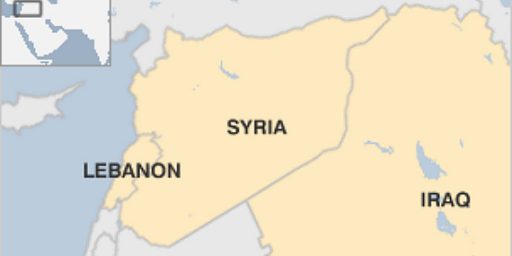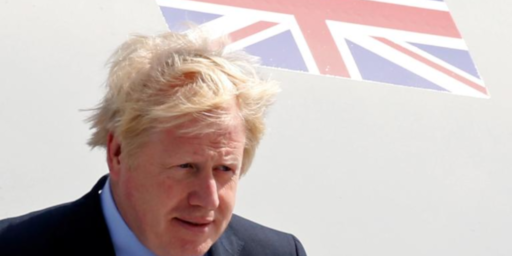Lebanon President Steps Down without Successor
 Lebanon’s president stepped down at midnight, as required by law, with no successor in place, leaving the country in constitutional crisis.
Lebanon’s president stepped down at midnight, as required by law, with no successor in place, leaving the country in constitutional crisis.
Reuters reports a power vacuum:
Lebanon stepped into uncharted territory on Saturday when time ran out on attempts to find a new president before President Emile Lahoud’s mandate expired. Lahoud, a pro-Syrian retired general in power for nine years, left the presidential palace vacant at midnight (5:00 p.m. EST) after parliament failed to find a successor acceptable to both sides in a bitter dispute with international ramifications.
Speaking in the palace driveway before riding off in a motorcade to his nearby private home, Lahoud said his conscience was clear and Lebanon was well. The Lebanese must choose a consensus president quickly because the existing cabinet, which is backed by the United States and Europe, was illegitimate, he added. “If that doesn’t happen, the price for Lebanon will be high. I hope we can get there as quickly as possible,” he said.
The cabinet, led by Prime Minister Fouad Siniora, says it automatically assumes the powers of the presidency until parliament agrees on a new head of state.
The United States, the United Nations, the European Union and conservative Arab states such as Saudi Arabia, Egypt and Jordan are expected to recognize the cabinet’s authority. But the other side in the dispute — an opposition alliance led by the Shi’ite Muslim group Hezbollah, backed by Syria and Iran — says the country no longer has any recognized executive.
London’s Guardian, however, paints a more dire picture.
Lebanon was again plunged into uncertainty yesterday after parliament failed in a fifth attempt to elect a president, and the former Syrian backed-president Emile Lahoud, whose term ended at midnight, passed control of the security services over to the army, declaring a state of emergency.
The US-backed government of Fouad Siniora rejected the declaration. “It is as if the statement was never issued,” said Siniora. The constitution says a president cannot call a state of emergency without government approval, but Lahoud and the Hizbullah-led opposition view the cabinet as unconstitutional following the walk out of its Shia ministers last year.
The country is now in a presidential vacuum, with thousands of troops deployed across Beirut, and is likely to stay that way until the elections, postponed until next Friday, are attempted again.
Neither side seems clear on what the army’s mandate will be, with some expecting it to play a noticeably greater role in managing the state and others anticipating a continuation of the status quo. Few Lebanese have expressed surprise at the move. It is generally seen as a stalling measure to give the two camps more time to find a way out of the impasse.
Some constitutional experts have said the move is meaningless and analysts say Lahoud’s offer was vague enough for the army to interpret it as it pleases. “This is essentially a military authority to oversee negotiations, but if the government takes over Lahoud’s responsibilities, the opposition will escalate,” said Amal Saad Ghorayeb of the Carnegie Middle East Centre. “But if the army steps in and assumes a greater role in the managing of the state, the opposition will stay silent and focus on negotiations.”
The government had said it would elect its own president without the participation of the opposition if a solution could not be reached. The opposition has said any such move is tantamount to a “coup”. If the two sides cannot agree on a candidate, the opposition has threatened to set up a second government operating in tandem, as was the case at the end of Lebanon’s 15-year civil war.
One hopes the parties resolve this crisis quickly and that this is rock bottom. There’s not much cause for optimism on that score, unfortunately. This is, to say the least, a tremendous disappointment given the tremendous hope less than three years ago during the so-called Cedar Revolution.
WaPo’s Anthony Shadid provides some color and background on how things unraveled. A brief excerpt:
This round of Lebanon’s crisis is ostensibly over parliament’s choice of a successor to Lahoud. But its roots go far deeper. On one side is a coalition around the American-backed government that claims legitimacy from a series of demonstrations that culminated March 14, 2005, and led to the end of Syria’s 29-year military presence in the country. On the other is an alliance between Hezbollah, a Shiite Muslim group supported by Iran and Syria, and Christian followers of Michel Aoun, a former general.
Unlike Lebanon’s civil war, often characterized as a Christian-Muslim conflict, this crisis has mobilized the country’s Sunni and Shiite Muslim communities against each other, with Christians divided between the two camps. At stake are questions fundamental to Lebanon’s identity: its stance toward Israel, the influence of foreign patrons here, and the balance of power among the country’s communities. To many, the choice of president will reflect the relative strength of one side or the other.
Much more at the link.
via OTB News
Photo credit: Ramzi Haidar/AFP/Getty






This is certainly more important than the whimsical discussion about Belgium’s lack of a government. I’m by no means an expert on Lebanon, but I have to wonder how much of this impasse stems from last year’s war with Israel, and Hezbollah’s rising influence as a result. This must be one of those “birthpangs” of Democracy.
I’m sure this doesn’t have anything to do with the constant agitation of the people in the region due to the 5 year US occupation of Iraq.